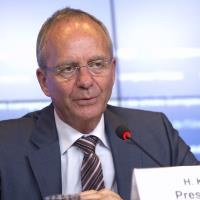(LUXEMBOURG) – Energy ministers agreed at their meeting on Tuesday to ensure that inter-governmental energy agreements between Member States and non-EU countries are more transparent and comply with EU law.
The aim of the proposed decision – part of the EU’s Energy Union strategy – is to enhance the transparency and consistency of the EU’s external energy relations and to strengthen its negotiating stance with regard to third countries. When individual EU countries negotiate energy agreements with non-EU countries, the Commission will ensure that these agreements comply with EU law.
This proposal is a major step that will enhance the transparency and consistency of the EU’s external energy relations”, said Dutch Minister for Economic Affairs and chair of the meeting Henk Kamp. “The aim is to correct shortcomings in the current information exchange mechanism and bring us closer towards the Energy Union. This will further enhance the proper functioning of the internal energy market and the security of energy supply in the European Union.”
The compromise reached was based on the following elements:
- the Commission will conduct an assessment of gas-related IGAs before they are signed,
- member states shall keep the Commission informed both before the start and regularly during the negotiations of all IGAs,
- member states may request the previous assessment for other non-gas related IGAs,
- all non-gas related IGAs shall be notified to the Commission “upon ratification”,
- non-binding instruments will not have to be notified.
The agreement on the general approach will allow the Council to start negotiations with the European Parliament with a view to the final adoption of the proposal.
The Council discussed the proposal for a revised regulation concerning measures to safeguard the security of gas supply.
The main purpose of the proposal is to minimise the impact of a potential gas disruption by improving cooperation between member states and by building on the achievements of the internal energy market. It also aims to increase trust and solidarity at the regional and EU level.
The debate focused on the following issues:
- Enhanced regional cooperation and coordination,
- New solidarity principle which will have a mandatory application in extreme crisis scenarios,
- Transparency requirements, in particular with regard to commercial long term gas contracts.


